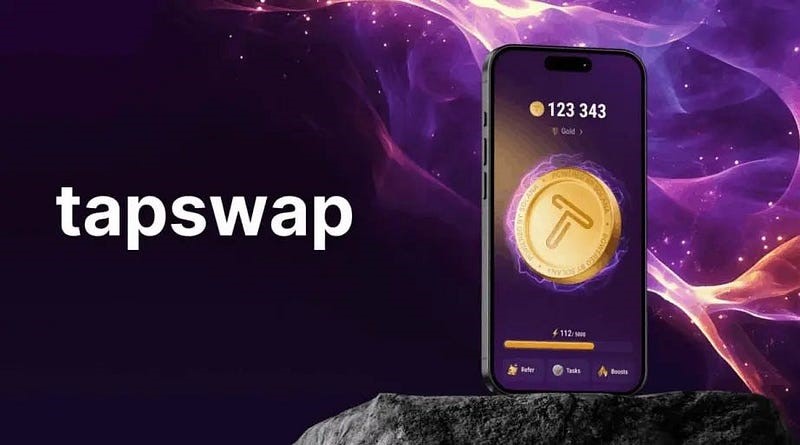Sometime last year, if you walked through any bustling market, sat in a danfo, or even visited a government office in Nigeria, chances are you’d see a familiar sight: people, young and old, hunched over their phones, their thumbs furiously tapping away. This wasn’t a new viral game; it was the Tapswap frenzy, a phenomenon that swept across the nation, promising a slice of the crypto pie with every relentless tap.
The allure of Tapswap was simple: “tap-to-earn.” Following the much-publicized success of Notcoin, another Telegram-based clicker game that reportedly rewarded early participants with significant sums, Tapswap arrived on the scene like a digital messiah for many Nigerians. Faced with high inflation, a depreciating naira, and a relentless search for alternative income streams, the idea of earning cryptocurrency for free, simply by tapping a screen, resonated deeply.
It wasn’t just about the money; it was about accessibility. Traditional crypto mining requires expensive hardware and technical know-how. Tapswap, accessed via a Telegram bot, lowered the barrier to entry to almost zero. Anyone with a smartphone and an internet connection could “mine” these digital tokens. The social aspect also played a huge role, with referral programs incentivizing users to invite friends and family, creating a viral loop that saw millions join the platform in a matter of weeks. Viral videos of people tapping in unusual places, from Keke drivers steering with one hand to traders in their stalls, became common, showcasing the widespread adoption and the near-addictive nature of the pursuit.
However, beneath the tapping frenzy lay a familiar crypto narrative: the promise of airdrops. Tapswap wasn’t true mining in the traditional sense; it was a marketing strategy, designed to build a massive user base and generate buzz before a potential token launch. The hope was that these accumulated “shares” or “points” would convert into valuable cryptocurrency ($TAPS) when the project eventually listed on exchanges.
The Tides Turn: The Post-Tapswap Reality
As with many such “play-to-earn” or “tap-to-earn” initiatives, the excitement around Tapswap eventually hit a wall. While the project aimed to list on the TON blockchain, and many held out hope for a lucrative payday, the reality of the conversion rate and the actual value of the tokens upon listing often fell short of the sky-high expectations. For some, it was a valuable introduction to the crypto space, a first touchpoint with digital assets. For others, it was a lesson in the speculative nature of nascent projects and the importance of due diligence.
The Tapswap phenomenon, while exhilarating, also highlighted certain vulnerabilities in the Nigerian crypto landscape:
- Information Asymmetry: Many participants, especially those new to crypto, lacked a full understanding of how such projects work, the risks involved, and the difference between speculative engagement and genuine investment.
- Regulatory Ambiguity: While Nigeria has recently made strides in regulating crypto, the “tap-to-earn” model existed in a grey area, leaving participants with little recourse if things went awry.
- The “FOMO” Effect: The fear of missing out on a potentially life-changing opportunity drove many into the frenzy, often overshadowing rational decision-making.
Beyond the Taps: What’s Hot in Nigerian Crypto Today?
Despite the ebb and flow of projects like Tapswap, Nigeria remains a vibrant and leading hub for cryptocurrency adoption in Africa. The underlying drivers – inflation, remittances, and a tech-savvy youth – continue to push Nigerians towards digital assets. The recent regulatory clarity, with the Securities and Exchange Commission (SEC) actively working on frameworks for crypto, is also creating a more stable environment.
Today, while the tapping might have subsided, Nigerians are increasingly engaging with more established and utility-driven crypto projects:
- Bitcoin (BTC) and Ethereum (ETH): These foundational cryptocurrencies remain the bedrock of many Nigerian crypto portfolios. They are seen as stores of value (especially BTC in the face of Naira devaluation) and platforms for decentralized applications (ETH).
- Stablecoins (USDT, USDC): Given the volatility of the local currency, stablecoins pegged to the US dollar are immensely popular for preserving capital and facilitating cross-border transactions without the immediate risk of price fluctuations.
- Solana (SOL): Projects like Solana, known for their high transaction speeds and low fees, continue to attract interest for their potential in DeFi (Decentralized Finance) and NFTs (Non-Fungible Tokens).
- Meme Coins with Utility (or Strong Community): While the speculative appeal of meme coins persists, there’s a growing awareness of projects like Dogecoin (DOGE) and Shiba Inu (SHIB) that, despite their meme origins, have built strong communities and are exploring various use cases.
- Emerging DeFi and Web3 Projects: As the ecosystem matures, more Nigerians are exploring decentralized finance applications (lending, borrowing, staking) and Web3 projects that offer real-world solutions beyond mere speculation.
- Blockchain Gaming and NFTs: The intersection of gaming and crypto, while still nascent, continues to draw interest, particularly among the younger demographic, as they look for new ways to earn and interact in digital spaces.
The Tapswap frenzy, while a memorable chapter, served as a powerful testament to Nigerians’ readiness to embrace new digital frontiers. It was a mass experiment in accessible crypto engagement, even if the outcomes were mixed. Moving forward, the focus for Nigerians in the crypto space is likely to be on projects with clear utility, robust technology, and a growing understanding of the risks and opportunities inherent in this ever-evolving digital landscape. The tapping may have stopped, but the journey into decentralized finance continues, with a more informed and discerning user base leading the way.









